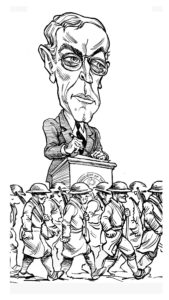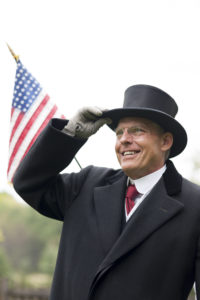For the 23rd season of our Chautauqua living history series, we are commemorating the 100th Anniversary of the United States’ entry into the Great War as three World War I-era figures come to life on the Chautauqua stage. As Chautauqua approaches, we will hear from the three scholar-actors who will perform at seven sites across Maryland this July. First up is Judd Bankert, who previews his performance as President Woodrow Wilson.
What drew you to this character?

I did not find the President; he found me. My wife and I moved to Staunton, Virginia, the birthplace of President Wilson, about twenty years ago. Soon after arriving I attended a reception on the grounds of the Woodrow Wilson Birthplace and Museum which is now the Woodrow Wilson Presidential Library and Museum. At that reception, I was approached by the Director of Educational Programs at the Birthplace and asked if anyone had ever told me I looked like Woodrow Wilson. That was the start of my twenty-year relationship with the President. What drew me to this character is his “character”; his belief that America was created, “to better the ideals of men, to make them see finer things then they had seen before, to get rid of the things that divide and to make sure of the things that unite.” It is this that has sustained my interest in the President.
How did you research your character and prepare for your performance?
Living in Staunton, Virginia, the home of the Woodrow Wilson Presidential Library and Museum, has allowed me to work directly with the staff and to use the resources at the Library. My interest in history and my experience as a public-school teacher (certified K-8) has helped me to prepare and create programs that are historically-accurate and hopefully entertaining and enlightening.
What is the most interesting facet of your character’s life?
Woodrow Wilson came to politics rather late in life. He was elected President when he was 56 years old, having only held one other elected office, Governor of New Jersey. This college professor’s meteoric political rise was only transcended by his equally extraordinary rise to international fame and influence. But midway through his second term as President, when in the grips of a battle over America’s entry into the League of Nations, he suffered a debilitating stroke which would make him an invalid for the remainder of his life and doom this effort. It is this tragic fall from grace and influence that resulted in America turning its back on the League; this was both a personal tragedy and a national and international one as well.
Did you learn anything new or surprising about your character through your research?
When I began to study the President, I did not realize what an incredible impact he had had internationally nor that he was idolized by the people of Europe. His doctrine of self-determination was seen as a call for the salvation of the peoples who had for centuries lived under the yokes of arbitrary governments. When Wilson arrived in Paris for the treaty negotiations at the end of the Great War, he was greeted by the largest crowds ever to gather in that city’s history. This greeting was repeated when he traveled to London and Rome.
This year our Chautauqua series commemorates the 100th Anniversary of the United States’ entry into the Great War. What do you think your character’s legacy was in World War I?
Wilson’s true legacy is in his political philosophy which he called “The New Freedoms.” The Great War disturbed and eventually ended his program of progressive reforms. I believe his legacy lies in his belief that the strength of any nation comes from its roots not its flowers. He believed that every government’s primary responsibility is to strengthen and improve the lives of its working men and women; that the business of government is to defend the common interest against the special interests; and that “one nation is distinguished from another nation by its ideals, not by its possessions; by what it believes in, by what it lives by; by what it intends; by the visions which its young men dream and the achievements which its men of maturity attempt.”
About Judd Bankert

Judd Bankert had just moved to Staunton, Virginia in 2000 when the curator of the Woodrow Wilson Birthplace approached him and pointed out that he bore a striking resemblance to the 28th President. Ever since Bankert has portrayed President Wilson as part of the Woodrow Wilson Presidential Library and Birthplace’s living history program. He has performed in scores of special interpretive programs and spoken at both public and private receptions. As a Staunton resident, he has access to one of the best research facilities for Wilson scholarship in the country. This, combined with an interest in history and experience as an educator (he was a certified K-8 teacher), has enabled him to create unique programs drawing from Wilson’s writings and speeches.

